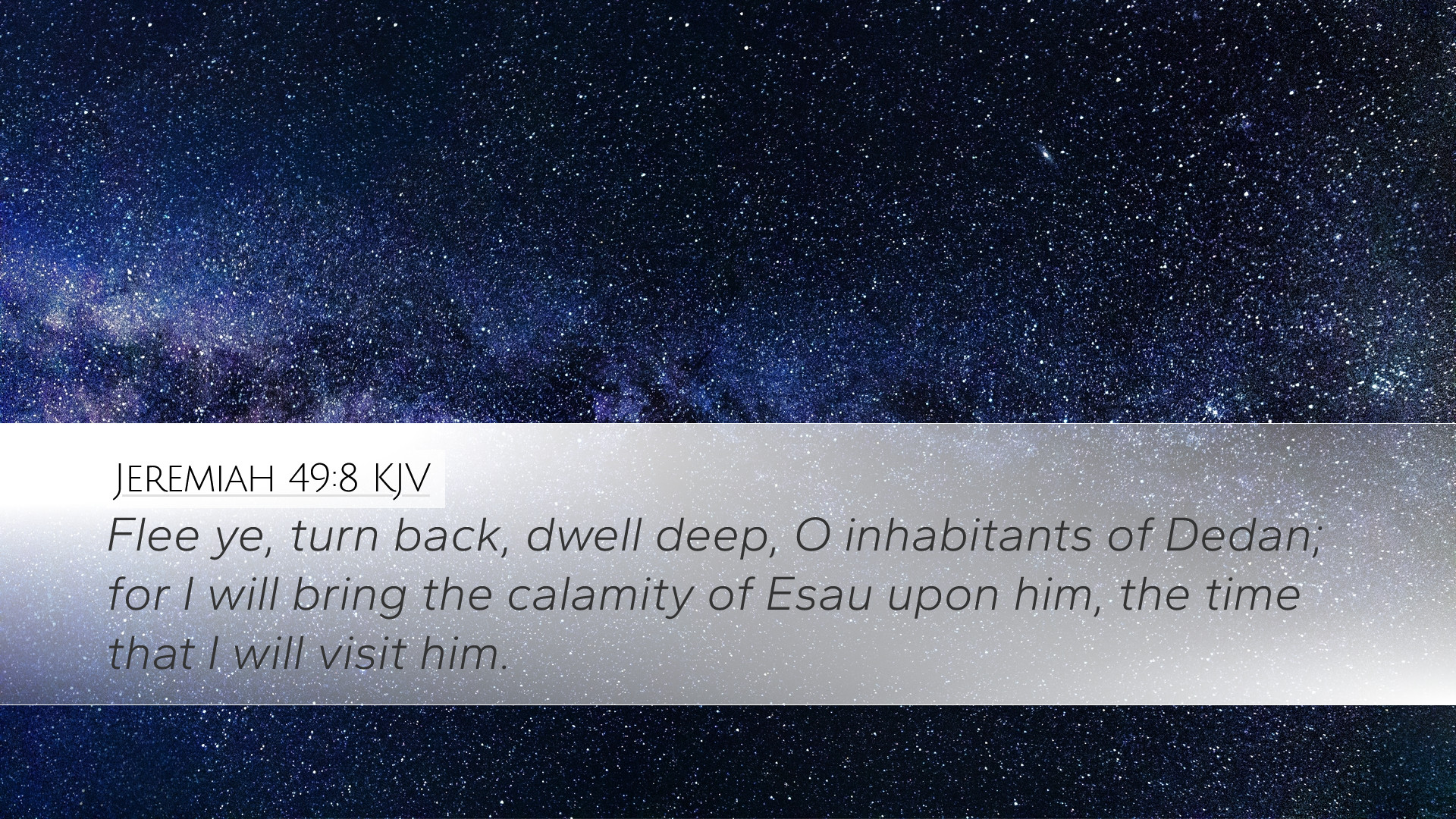Commentary on Jeremiah 49:8
Verse Text: “Flee ye, turn back, dwell deep, O inhabitants of Dedan; for I will bring the calamity of Esau upon him, the time that I will visit him.”
Introduction
The verse Jeremiah 49:8 addresses the inhabitants of Dedan and is part of a larger prophetic context concerning the judgment against Edom and other nations. This commentary draws insights from various public domain sources, including Matthew Henry, Albert Barnes, and Adam Clarke, to provide a comprehensive understanding of its implications for theological study, pastoral application, and historical context.
Contextual Background
Jeremiah prophesies during a tumultuous time in Israel’s history, foretelling the fall of Jerusalem and the impending judgment that would come upon various nations, including Edom. Dedan, mentioned here, was located in the vicinity of Edom, known for its trade and commerce. The mention of deducing God's judgment serves to emphasize the broader reach of His sovereignty over the nations.
Theological Insights
This passage carries significant theological weight, particularly concerning God’s judgment and mercy.
- The Judgment of Nations: As noted by Albert Barnes, the phrase “I will bring the calamity of Esau upon him” indicates a divine decree that reflects the inevitability of God’s judgment. This underscores a recurring biblical theme where nations, not just Israel, are held accountable for their actions before God.
- Exhortation to Repentance: Jeremiah's command to “flee, turn back, dwell deep” carries an urgent tone of repentance. The inhabitants of Dedan are called to recognize their precarious situation and respond with urgency. This parallels contemporary calls to repentance, inviting modern readers to consider their own lives in light of God’s impending judgment.
- The Sovereignty of God: Henry notes that God's sovereignty is affirmatively asserted in this proclamation. The judgment of Esau serves as a reminder that no nation or individual stands outside the influence and rule of the Almighty.
Historical Context
Dedan was historically significant due to its wealth and trade routes in the ancient Near East. It was inhabited by the descendants of Dedan, a grandson of Abraham through Keturah. Understanding this lineage provides depth to the interaction between Dedan and Edom, highlighting the historical conflict and relationships that influenced the socio-political landscape of the time.
Literary Analysis
Jeremiah employs a direct address, characteristic of prophetic literature, which serves to capture the attention of both the recipients of the message and readers today. The urgent tone of the verse evokes a sense of immediacy regarding the consequences of sin, demonstrating how divine judgment operates in both the temporal and spiritual realms.
Application for Today
The message contained in Jeremiah 49:8 extends beyond its historical and theological implications. It serves as a call to introspection and accountability for individuals and communities today.
- Recognition of Consequences: Just as Dedan was warned of impending destruction due to the calamity facing Edom, contemporary readers are reminded of the reality that every action bears consequences before God.
- The Urgency of Spiritual Preparedness: The call to “flee” suggests a need for immediate action. This echoes the New Testament themes of readiness for Christ's return, emphasizing how vital it is for believers to remain vigilant in their spiritual walk.
- Importance of Community Repentance: The communal aspect of Jeremiah's message reflects the importance of collective acknowledgment of sin and the need for corporate repentance in today’s church context.
Conclusion
In summary, Jeremiah 49:8 offers profound insights into divine judgment, the necessity of repentance, and the accountability of nations and individuals before God. The historical context enriches our understanding, while the theological themes resonate with contemporary spiritual challenges. For pastors, students, theologians, and scholars, this verse serves as a rich resource for exploring the dynamics of God’s unwavering sovereignty and the persistent call to heed His voice.


